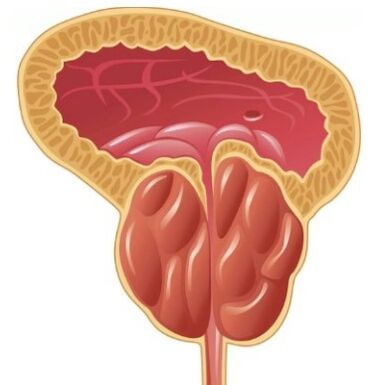Prostatitis is a disease which, according to statistics, each tenth man suffers.Pathology is diagnosed mainly at the age of 30 to 50 years.

Many men are embarrassed to talk about the symptoms of prostatitis to the doctor, which leads to the transition of the disease in a chronic form, complicates treatment and turns into problems with reproductive function.It is important to start therapy at the initial stage of the pathological process.On drugs for prostatitis in men, it is therefore most often prescribed and considered to be the most effective.
What is prostatitis
prostatitis is a disease characterized by an inflammatory process in the prostate gland (seed).Iron fulfills a number of the most important functions, one of which is the production of a specific ejaculate secretion, which provides protection and nutrition of sperm.The composition of the liquid contains enzymes, proteins, fats, hormones, without which the reproductive system will not normally do its work.
Another most important function of the prostate is the slimming of the sperm, because of which spermatozoa becomes more mobile and, with greater degree of probability, will reach their objective.In the prostate gland, his work is disturbed.At the same time, man feels characteristic symptoms.
The causes and signs of prostate inflammation
The main source of prostatitis development is the penetration of infection and stagnant processes in the tissues of the seed gland.Bacteria and microbes fall into the prostate of:
genitals;
- Chronic focus distant from infection by blood flow (cavities, sinusitis, flu, pneumonia, angina, chest, furunculose);
- The fiery organs nearby (fiery rectum), etc.
factors preceding the development of the disease:
- Long abstinence of sexual intercourse;drugs;
- frequent interruptions of sexual intercourse;
- lower ejaculation;
- irregular sexual life;
- hypodynamia;
- frequent constipation;
- States that inhibit immunity (stress, malnutrition, lack of sleep);
- simple or constant hypothermia;
- the presence of chronic infections (bronchitis, amygdalite, cholecystitis);
- Sexual, after which sexual intercourse do not follow;
- Transferred urological diseases (cystitis, uretritis);
- Transfer of sexual infections (gonorrhea, trichomonase).
- Hyperplasia, or prostate adenoma, with a mild course, can also cause the development of the disease.In addition, the predisposing factor of the appearance of prostatitis is the injuries of the perineum.Often, they are observed in motorcyclists, motorists, cyclists, etc.The main reason for the latter is iron stagnation.This leads to the difficulty of blood circulation in small vessels, edema of prostate tissues, increased oxidation of free-radical lipids.All these processes create inflammation conditions and the occurrence of intense pain in the perineum and the genitals.
L'hyperplasie, ou adénome de la prostate, avec un cours bénin, peut également provoquer le développement de la maladie. De plus, le facteur prédisposant de l'apparition de la prostatite est les blessures du périnée. Souvent, ils sont observés chez les motocyclistes, les automobilistes, les cyclistes, etc.
Il convient de noter que la prostatite bactérienne est diagnostiquée par 8 fois moins que non infectieuse. La raison principale de ce dernier est la stagnation en fer. Cela conduit à la difficulté de la circulation sanguine dans les petits vaisseaux, l'œdème des tissus de la prostate, une oxydation accrue des lipides en libre-radicaux. Tous ces processus créent des conditions d'inflammation et la survenue d'une douleur intense dans le périnée et les parties génitales.
During the period of exacerbation of prostatitis, men are observed:
- Quick ur;
- urine can come out with blood impurities, pus;
- mental disorders - irritability, lack of sleep, anxiety;
- the violation of the urination process - can be difficult, painful;
- pain in the scrotum area, rectum and penis;
- violation of an erection.
Body can increase slightly.
Pharmacological groups of prostatitis drugs
There are the following pharmacological groups of drugs for the treatment of prostatitis:
- antibacterial drugs for prostatitis.They are prescribed to eliminate pathogenic microflora.With the help of active substances that make up drugs, pathogens that have caused the infectious process are destroyed.Antibiotics are taken at the aggravated stage and during the period of remission of the disease.
- Alpha-drenoblokatoratory.Doctors prescribe this group of drugs when it is necessary to improve urodynamics, relieve the flow of urine in patients and reduce the probability of the consequences of hyperplasia.
- Antispasmodic.These drugs for the treatment of prostatitis are prescribed for pain to relax the smooth prostate muscles, improve blood circulation.
- Non-steroidal anti-inflammatory drugs with analgesic effect.These drugs for the treatment of prostatitis are prescribed for pain, an increase in the tone of perineum muscles, problems during urination and the inflammatory process.
- Analgesic.Stop the pain.They are prescribed in the form of tablets, rectal candles, injections.
- Phytopreparations.The composition of drugs includes only natural plant components.They are prescribed in combination with drugs.Designed to eliminate pain, inflammation, relieve mental stress.They are prescribed both in a chronic form and in exacerbation (in combination with other drugs).
- Hormonal drugs for prostatitis.Eliminate the inflammatory process, reduce the swelling of the gland, normalize the urination process.

How to choose the drug
Choose drugs for prostatitis should be necessary depending on the form of the disease.With exacerbation, antibiotics are mainly prescribed.The sooner you will start to take antibacterial agents, the more the symptoms will disappear quickly and less the complications and the transition of the disease to the chronic stage.
If the disease is accompanied by pain in the organs of the genito-cross system, mental disorders in the form of irritability, anxiety, insomnia, sexual disorders.In this case, drugs that improve blood circulation that remove pain, the inflammatory process and psyche problems should be taken.For these purposes, they are named:
- analgesic;
- antispasmodic;
- NSAIDs;
- antibacterial drugs (with frequent exacerbations);
- immunomodulators;
- plant sedatives.Independent treatment can lead to serious consequences, including infertility.

























